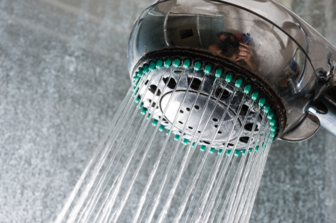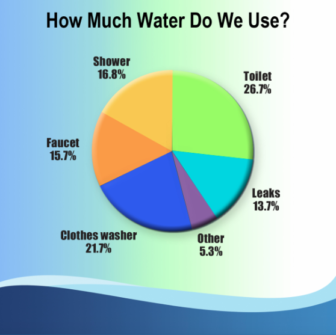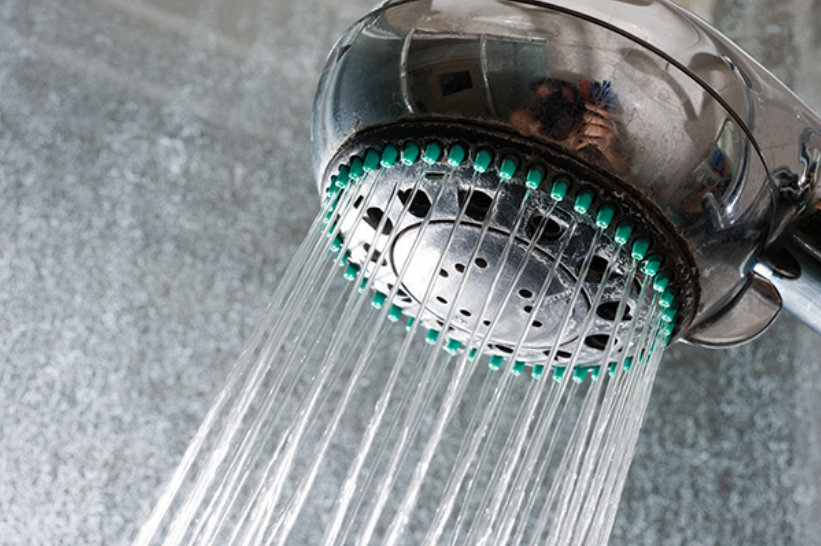Understanding water consumption and conservation is becoming more and more important. As the current climate is becoming more unstable, so is the security of our water supply.
Just two years ago, Darien experienced a drought even though the state’s overall rainfall has been increasing as our climate warms. It’s important to think about water conservation as extreme weather events, like droughts and hurricanes, which pose threats to our water supply are becoming more common due to climate change.
Proper precautions should be taken to protect, secure, and manage our usage of our stores of potable water for the future.
— Citations showing sources of information are included in parentheses at the end of some paragraphs. Links to those websites are provided in the two paragraphs just below.
It’s important to understand just how much water we each utilize, and which aspects of our lifestyles consume the greatest amount. Concerning indoor water use, 75 percent of water is used in the bathroom, according to the “Water Facts” page on the Aquarion Water Co. website.
A 10-minute shower uses 25 gallons of water while a bath can use 35-50 gallons of water. Running faucets can waste around 3 gallons of water per minute, according to the Water Calculator website.
Cutting down how often you shower and the amount of time your showers last, installing low-flow technology, or simply running your faucet for less time can make a significant difference.

Photo from the Aquarion.com website
Replacing shower heads with water-efficient models is one way to conserve water.
Outdoor water usage is equally as important: it makes up over 30 percent of household water use. Households that use automatic sprinkler systems use almost 40% more water that those without them (Aquarion).
So, what are some easy ways that you can make a difference in saving water? A simple way to ensure less waste is to simply check for leaky faucets or faulty sprinklers; maintenance is important. Even a small leak or faucet that drips, can waste over 60,000 gallons of water a year (Aquarion).
Watering your lawn and garden less frequently makes a big difference as well, and it can increase lawn health. Some ideas to use less water are to set lawn mowers to 3-4 inch cutting height, implement soil moisture sensors or drip irrigation systems, water your lawn no more than twice a week, and water lawns at cooler times of the day to reduce water loss due to evaporation.
 Lastly, it’s important to understand virtual water use. Virtual, or indirect water use, such as the water needed to produce gasoline and animal food products, can impact water supplies on a much larger scale. This kind of consumption can come in surprising forms.
Lastly, it’s important to understand virtual water use. Virtual, or indirect water use, such as the water needed to produce gasoline and animal food products, can impact water supplies on a much larger scale. This kind of consumption can come in surprising forms.
A lot of water is used to produce consumer goods and electricity, so using less of these water-intensive products can sharply reduce your virtual water use. For example, “it takes at least twice as much water to produce a plastic water bottle as the amount of water contained in the bottle” (Water Footprint).
Approximately one to 2.5 gallons of water are necessary to refine one gallon of gasoline (Aquarion). Furthermore, “the water footprint of one pound of cotton is 1,320 gallons. That equals over 650 gallons of water for one new cotton t-shirt” (Water Footprint).
Therefore, drinking from reusable water bottles, trying to find alternative methods of transportation besides your car, and shopping less are actions that can significantly reduce your virtual water use.
See also:
Links from the Aquarion.com website:
- Cheap And Easy Conservation Tips
- Commercial Water Audit
- Conservation
- Easy Ways To Conserve
- Easy Ways To Save Even More Water
- Finding Leaks
- Free And Easy Conservation Tips
- How Much Can You Save?
- How To Find And Stop Leaks
- Interactive Water Calculator
- Interactive Water Calculator Results
- Lawn & Garden Irrigation Tips
- Leak Detection Checklist
- Not As Cheap But Still Worthwhile Conservation Tips
- Searchable Solutions
Your diet is another critical contributor to your virtual water use. Animal products, especially beef and pork, require the highest amount of water to produce out of all food types (Water Footprint).
Surprisingly, it takes 120 gallons of water to produce just one egg (Aquarion). Trying to reduce the number of days you eat meat in a week by one day can have a large impact on your water consumption. For example, try Meatless Mondays.
Take the Survey
If you’d like to learn more about what you can do to make a difference, please fill out the survey here or visit the websites for the Darien Land Trust, Darien Environmental Protection Commission, or Darien Pollinator Pathway websites.
Water Conservation Workshop on Aug 15
Also, learn more about water usage and water at this free Water Conservation Workshop:
—What: Water Conservation Workshop
—Where: Board of Education Meeting Room, 35 Leroy Ave, Darien
—When: Monday, Aug. 15 at 7 p.m.
—Co-sponsored by: The Darien Advisory Committee on Sustainability, the Darien Nature Center, Darien Pollinator Pathway, and Aquarion
___________________
Editor’s note: Nisha Nalawade is a senior at Darien High School and part of a UConn CTP program this summer. She’s working with the Environmental Protection Commission in Darien.
She writes: “My project is to help Darien become a certified Sustainable CT town. I’m creating educational materials for a workshop in August. Representatives from the EPC, Pollinator Pathway program, and Aquarion are planning to be there.”

